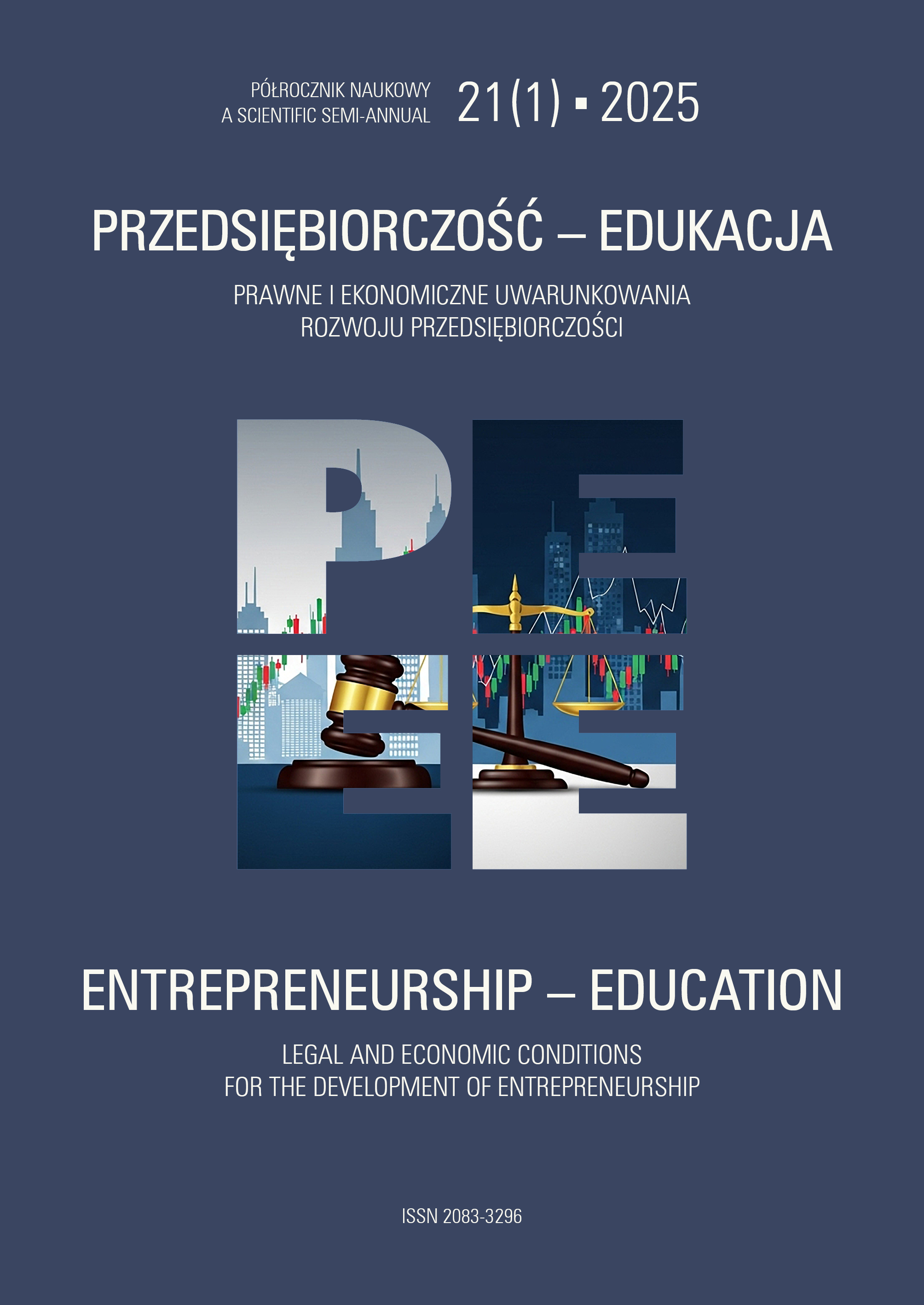Selected forms of support in the Krakow startup ecosystem: pilot study results
DOI:
https://doi.org/10.24917/20833296.211.18Keywords:
startups, startup ecosystem, mentoring support, capital support, investor, networkingAbstract
Innovations and the introduction of new solutions to the market are currently key elements of economic development. Startups are largely responsible for this, and their development is supported by the local startup ecosystem. The main objective of the article is to attempt to identify selected forms of support for startups, especially in the pre-seed stage, offered by the Krakow ecosystem. The following research methods were used: a case study (Krakow startup ecosystem) and pilot surveys among purposefully selected participants. The research was conducted among various participants of the local ecosystem, i.e. representatives of startups, investors, entrepreneurs and representatives of institutions supporting them. The research shows that the Krakow startup ecosystem offers numerous forms of support, including access to financing, mentoring and knowledge resources. Thanks to this, it creates favorable conditions for their development, especially in the initial stages of activity. Respondents also indicated the weaknesses of the local ecosystem and areas requiring improvement.
References
Baloutsos, S., Karaginanaki, A., Pramatari, K. (2022). Identyfying contradictions in an incumbent-startup ecosystem – an activity theory approach. European Journal of Innovation Management, 25(6), 527-548. Doi: 10.1108/EJIM-04-2020-0114.
Blank, S. (2013). Why the Lean Start-up Changes Everything. Harvard Business Review, 91(5), 63–72.
Bursiak, L. (2013). Diagnoza i pozycjonowanie sytuacji finansowej firm start-up oraz spółek z rynku Newconnect w roku 2011, Zeszyty Naukowe Uniwersytetu Szczecińskiego. Finanse. Rynki finansowe. Ubezpieczenia 59, 49–58.
Cieślik, J. (2014). Przedsiębiorczość, polityka, rozwój, Wydawnictwo Akademickie Sedno, Warszawa.
KMS (2024a), Misja KMS, https://kms.org.pl/nasza-misja (dostęp: 10.07.2024 r.).
KMS (2024b), Projekty KMS, https://kms.org.pl/projekty (dostęp: 10.07.2024 r.).
KPT (2024a). O KPT, https://www.kpt.krakow.pl/o-nas/o-kpt (dostęp: 10.07.2024 r.).
KPT (2024b). Oferta KPT dla startupów, https://www.kpt.krakow.pl/startupy/oferta-kpt-dla-startupow (dostęp: 10.07.2024 r.)
Kuźmińska-Haberla, A., & Bobowski, S. (Eds.). (2023). Rola ekosystemu w rozwoju startupów. Przypadek Wrocławia. Wydawnictwo Uniwersytetu Ekonomicznego we Wrocławiu.
Kuźmińska-Haberla, A., Bobowski, S., Michalczyk W. (2019). Ekosystem startupowy w krajach Grupy Wyszehradzkiej ze szczególnym uwzględnieniem Wrocławia. Prace Naukowe Uniwersytetu Ekonomicznego we Wrocławiu, 63(11), 55-70. DOI: 10.15611/pn.2019.11.04
Lipińska, A. (2018). Koncepcje i kluczowe czynniki rozwoju ekosystemów startupów. Studia Ekonomiczne. Zeszyty Naukowe Uniwersytetu Ekonomicznego w Katowicach, 351, 46‒57.
Maciejewski, M. (2022). Startupy jako szczególny przejaw przedsiębiorczości, w: W. Pasierbek, K. Wach (red.), Przedsiębiorczość, Akademia Ignatianum w Krakowie, s. 143-158.
Majewski, M. (2022). Startupy i ich ekosystem, w: A. Kuźmińska-Haberla, S. Bobowski (red.), Rola ekosystemu w rozwoju startupów. Przypadek Wrocławia. Wrocław: Wydawnictwo Uniwersytetu Ekonomicznego we Wrocławiu, 13-33. DOI: 10.15611/2022.09.1.01
Mańkowska, N. (2022). Charakterystyka; źródła finansowania i wartość start-upów branży MedTech w Polsce. Prace Naukowe Uniwersytetu Ekonomicznego we Wrocławiu, nr 66(4), s. 100-115.
OMGKR, 2024). Our mission, https://www.omgkrk.com/our-mission (dostęp: 20.07.2024 r.)
Rejman, K. (2007). Wpływ innowacyjności na efektywność współczesnych przedsiębiorstw. Przedsiębiorczość-Edukacja, nr 3, s. 220-224.
Ries, E. (2011). The Lean Startup, Crown Business, New York.
Skala, A. (2017). Spiralna definicja startupu. Przegląd Organizacji 9(932), 33-39. DOI: 10.33141/po.2017.09.05
Szczepanowski, A.E. (2023). Czynniki zewnętrzne wpływające na innowacyjność przedsiębiorstw województwa podlaskiego. Przedsiębiorstwo & Finanse, nr 33, s. 79-96.
Urbaniec, M. (2016). Sustainable competitiveness. Opportunities and challenges for Poland’s economy. Ekonomia i Środowisko, nr 4(59), s. 34-51.
Downloads
Published
How to Cite
Issue
Section
License
Copyright (c) 2025 Entrepreneurship – Education

This work is licensed under a Creative Commons Attribution-NoDerivatives 4.0 International License.
Articles are published under the terms of the Creative Commons License (CC BY-ND 4.0; Attribution– NoDerivs).

